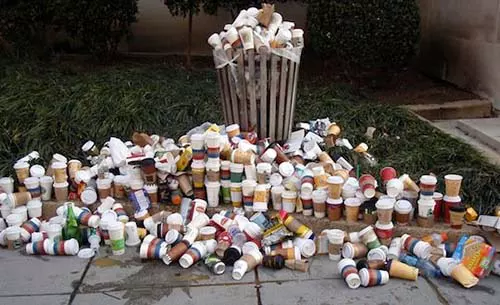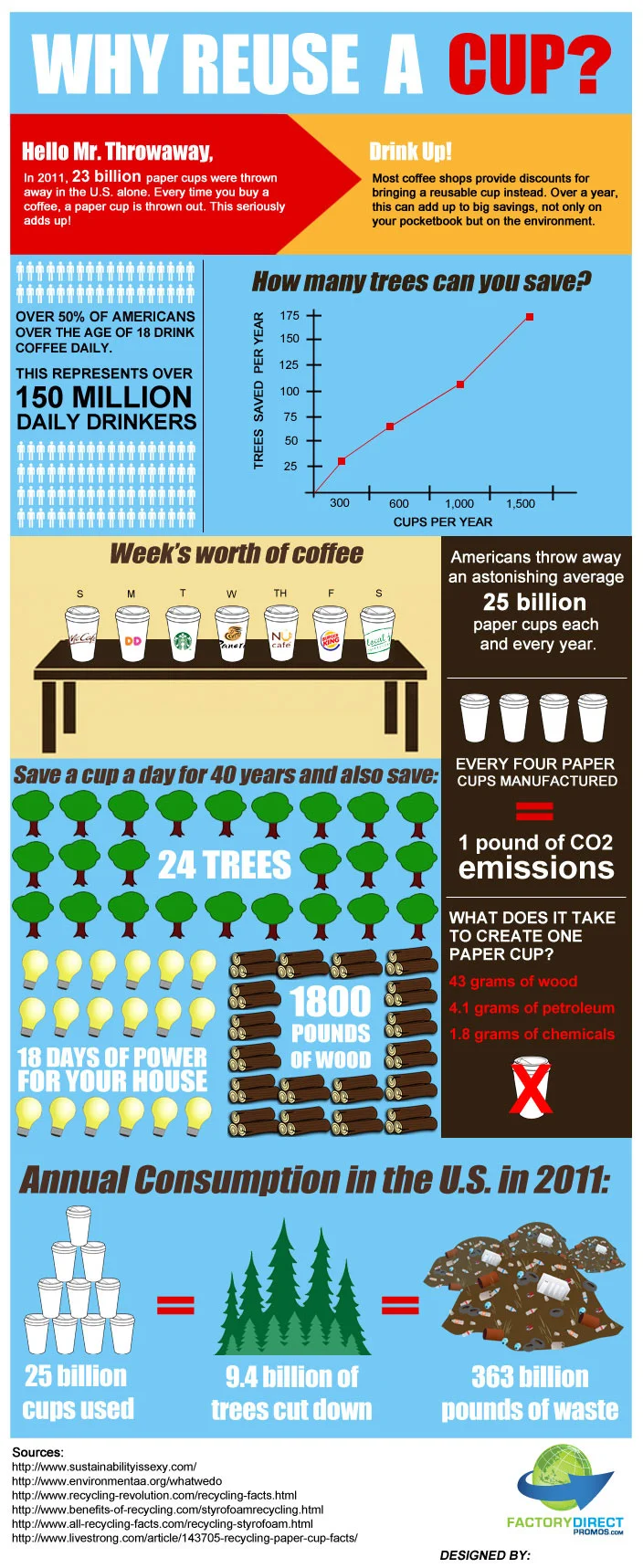Why Reuse a Cup? Check Out Our Infographic and Find Out!

On average Americans throw away 25 billion paper coffee cups each year. This is a staggering amount, and accounts for a massive use of resources. To make matters worse, disposable coffee cups are very difficult to recycle and leave a long lasting and unfortunate legacy. What is the best way to take your coffee to go? In a reusable travel coffee cup – check out our infographic to learn why this is the cup of choice.

Feel Free to Share Our Infographic on Your Site Using The Following Code:
<a href="https://www.factorydirectpromos.com/why-reuse-a-cup" ><img src="http://static.factorydirectpromos.com/media/wysiwyg/Infographics/info.jpg" at="Why Reuse a Cup?" title="Why Reuse a Cup?" /></a>What’s the Harm in Single-Use Cups?
9.4 billion trees were cut down in 2011 in order to meet up with the demand of paper coffee cups. Trees are valuable resources that convert CO2, which is a greenhouse gas, into breathable oxygen. Cutting down trees is necessary to produce paper, but paper coffee cups are not necessary.
Most disposable paper coffee cups feature a thin layer of wax or plastic. This makes the cups water-tight and durable, but it also makes it really tricky to recycle the cups. A specialized process is required to separate the water-resistant material from the paper before the paper can be processed for recycling; however, not all recycling facilities have the ability to do this.
Cups are either carted off to another facility (which means even more fossil fuels are burned and greenhouse gases emitted), or the cups end up in a landfill. Given enough time and exposure to the elements the paper will break down, but the wax or plastic lining will not break down.
Styrofoam Cups Are Even Worse for You and the Planet
Don’t even get us started on the impact of polystyrene, also known as Styrofoam cups. Aside from being classified as a possible human carcinogen and with enough exposure causing all sorts of health problems, polystyrene also has some pretty serious environmental impacts.
Cups made using petroleum polystyrene wastes non-renewable resources and recycling rates are low. Disposable coffee cups are bad news regardless of the material the cup from which the cup is made.
Financial Benefit to Reusable Cups
Most coffee shops provide a discount to customers who bring their own reusable coffee mug. This discount is typically about 50-cents per fill up; so over the course of a work week that adds up to $2.50 per week.
This may not seem like a lot, but it works out to $10 per month, or about $120 in savings per year. This isn’t a huge savings, but it is still significant and helps your bottom line, while also doing right by the planet. One reusable cup can last for years, so that can do the job of hundreds of single-use cups and save dozens of trees.
What Are Reusable Cups Worth to Your Brand?
The longer a reusable product lasts, the longer it will be out there spreading the word about your brand, and even garnering leads and information on prospects when made interactive with QR codes.
Reusable cups also make great promotional tools because these are items people tend to use every day. That means your customers will see your logo and marketing message as they pour their daily coffee and every time they take a sip. When your customers take their drink on the go and carry your branded reusable cup while they run errands or at work, they will continue to increase your brand’s awareness and recognition.
Custom logo reusable cups are a great environmentally friendly marketing item because they eliminate the need for disposable cups. They can be made using recycled plastic or stainless-steel, both of which can be recycled once they have fulfilled their usefulness.
Aside from the material, you can also select the size and color of your custom reusable cup, along with the printing colors. Let us know what you’re interested in by filling out a product quote request and we can put together a quote and answer any questions you have, or feel free to call us at 866.222.0949.
Tagged




